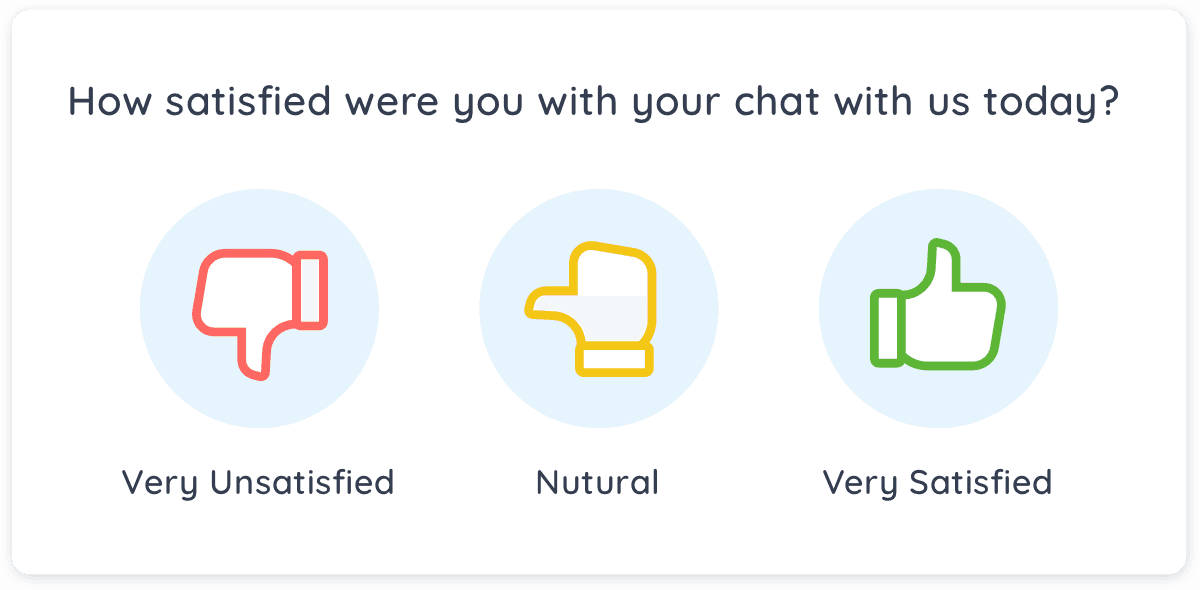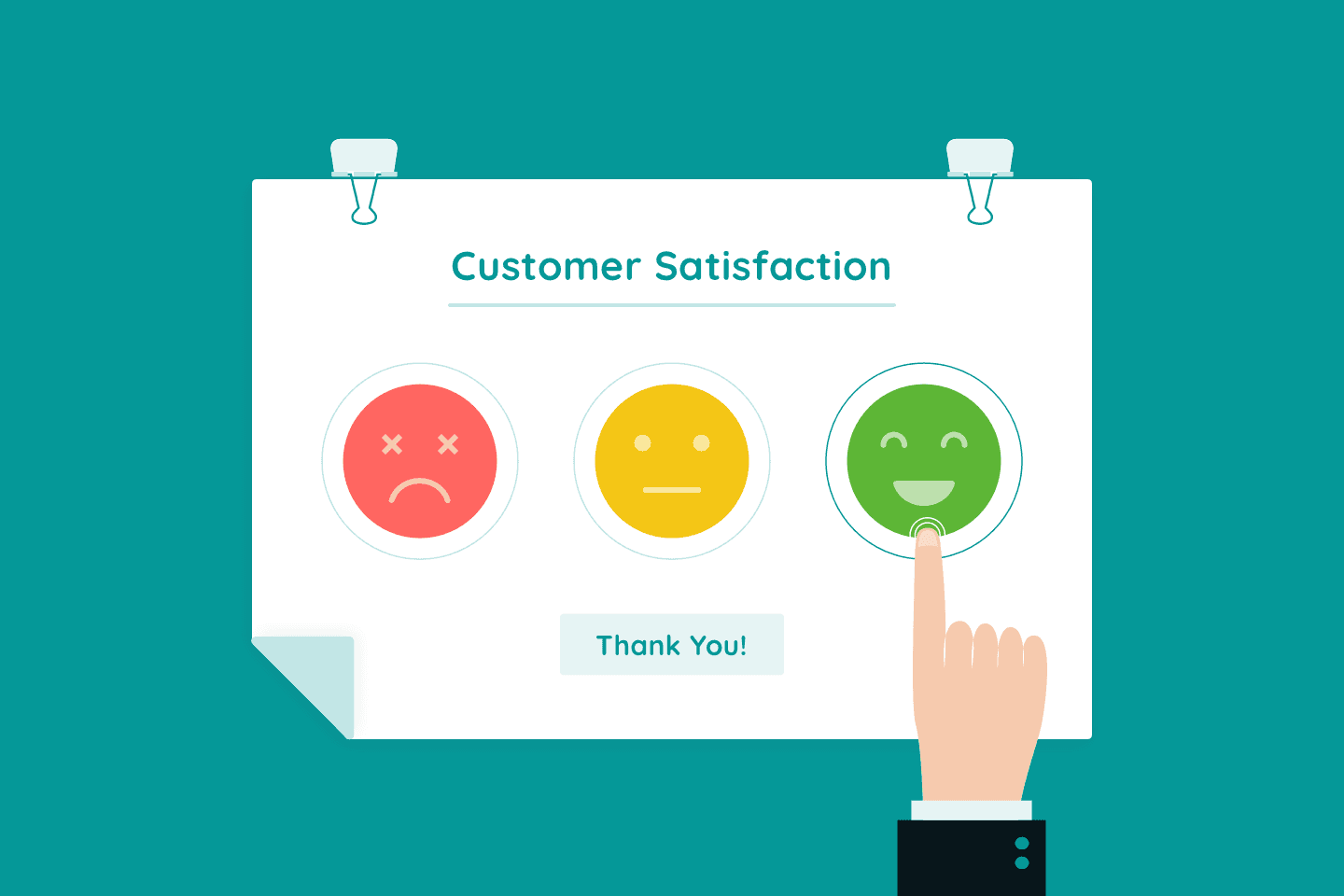What is CSAT?
Customer satisfaction (CSAT) is a metric used to determine how satisfied a customer is with a product, service, or experience. It is one of the 3 key metrics that you want to track to make sure your customers are happy and taken care of. This metric is usually calculated through a survey that asks a customer to rate how satisfied they are with a support interaction, purchase, or overall customer experience, with answers between “very satisfied” and “very unsatisfied”.
Why is it important?
Customer service is one of the most important aspects that can set apart a company from its competitors, and customers are the best source for feedback. Their responses can offer you valuable insights on what you’re doing right and what you need to improve.
It gathers pivotal insights to help you analyze customers’ needs and craft personalized solutions to keep customers with you.
How to design a questionnaire for customers
In order to accurately identify the nuances of customer satisfaction and service expectations of consumers, and the respective areas of opportunity, we need to ask questions differently. The most important aspect of crafting a CSAT Survey questions is using the right words that account for effort and are broad enough to allow each customer to speak their mind about a product or service.
In order to ask the right questions, be clear on which answers you want from your customers and design the questions accordingly.
A good customer satisfaction survey needs to include:
- Multiple choice questions – “What do you value most about our (product or service) offering?”
- Scoring questions – “How likely are you to recommend our company based on your last interaction with our customer service and support team?”
- Open-ended questions – “How can we improve your experience?”
- “Wild card” questions – “What might have prevented you from purchasing our product/service?”
The Do’s and Don’t of CSAT surveying
Do’s
- Send the questionnaire right after the chat is over
- Ask for an overall rating first
- Limit questionnaire to a reasonable number of questions
- Respond in a timely manner after receiving answers
- Offer a small number of choices in multiple choice questions
- Thank them for filling in the survey
Don’ts
- Avoid demographic questions such as age, ethnicity, etc.
- Don’t be intrusive, keep your tone casual
- Stear away from internal jargon that the customer won’t understand
- Avoid harassing customers to fill in the survey
- Don’t alter their answers
Tips to improve CSAT
Customer satisfaction is all about assisting clients effectively by handling their issues with accuracy, efficiency, and kindness. All of these components lead to happy and loyal customers, which is the goal of every company.

On the other hand, unhappy customers will have plenty of motivation to leave the company and become your most harsh critics. In the age of Yelp reviews, this is not a risk any company can afford to take.
There are three factors that have the biggest impact on improving CSAT:
#1 – The subject matter
You need to keep the conversation focus on what the customer wants. If you digress or fail to acknowledge the customer’s needs, they will be frustrated and won’t fill out positive surveys.
#2 – Your response time
Taking too long to respond will make the customer think they aren’t your priority or you don’t know what you’re doing, do your best to respond promptly and accurately.
#3 – The number of back and forth interactions
Avoid asking too many questions back and forth without an apparent reason. Keep the conversation focused to avoid sending more messages than necessary.
Here are some tips on how you can improve CSAT survey scores and keep ridding the world of bad customer experiences.
Apply these tips to improve CSAT:
Personalize the interaction
One key way we can personalize an interaction is by using the customer’s name and taking ownership to show them you’re on their side. When you communicate person to person, you make the customer feel reassured of your willingness to help.
Acknowledgment and empathy
Customers will fill surveys if they know you are going the extra mile by acknowledging their concerns and using empathy statements. Your acknowledgment will communicate to them that you are paying attention, and empathy will show them that you care about helping them.
Tone and Communication Skills
The tone is a crucial key point to driving Customer Satisfaction, as it’s how we convey both acknowledgment and empathy. A customer isn’t likely to leave a good survey if your tone wasn’t empathetic nor helpful, even if you did solve their issue and followed company policies.
Don’t keep customers waiting
Respond in a timely manner after receiving answers. If you must make them wait, let them know what you’re doing while they wait so they don’t feel neglected.
Deliver positive experiences
Do your best to make sure your customer is happier at the end of the interaction. Avoid rejection at all costs, instead of saying “No”, offer them alternatives. If we focus on what we can do, we can deliver a positive experience.
Show appreciation
Thank them for their time, and feel free to ask them for feedback. But never harass a customer to fill a survey! That’s a foolproof way to make them rate you negatively.
Analyze the results
Now once we’ve compiled the data, the numbers will reflect ups and downs. How do we replicate the ups and avoid the downs?
Look at what the data says
Gathering data is useless if we don’t pay attention to what it says, so you need to listen to the story the data is telling you by reading the numbers correctly. Pay attention to which data matter most, and use that data to create more success stories.
Identify which metrics matter the most
It’s not practical to focus on ten metrics at once. Prioritize the top three or four metrics that really drive success for the company, and decide which timeframe is most useful for analyzing the data: daily, weekly, monthly, etc.
Explore new ways to analyze
Feel free to share how you analyze data, and learn from other people; ask for feedback and implement new methods that are useful to understand what the score is, why the score is what it is, as well as measuring progress towards goals and designing plans to create accountability.
Celebrate your success!
Don’t hesitate to reward yourself when you’ve done something right or accomplished milestones, success is always worth celebrating!
Conclusion
So that’s the gist of it. Customer satisfaction is essential because it helps you build trust, solve problems, and retain loyalty. So ask the right questions, improve CSAT, and analyze the data to keep doing what you’re doing right, stop doing what you’re doing wrong, and detect your areas of improvement.




